Everyone says this stand mixer is better than a KitchenAid - has Bosch actually bettered the baking icons?
I've had an exi-stand mixer crisis over here
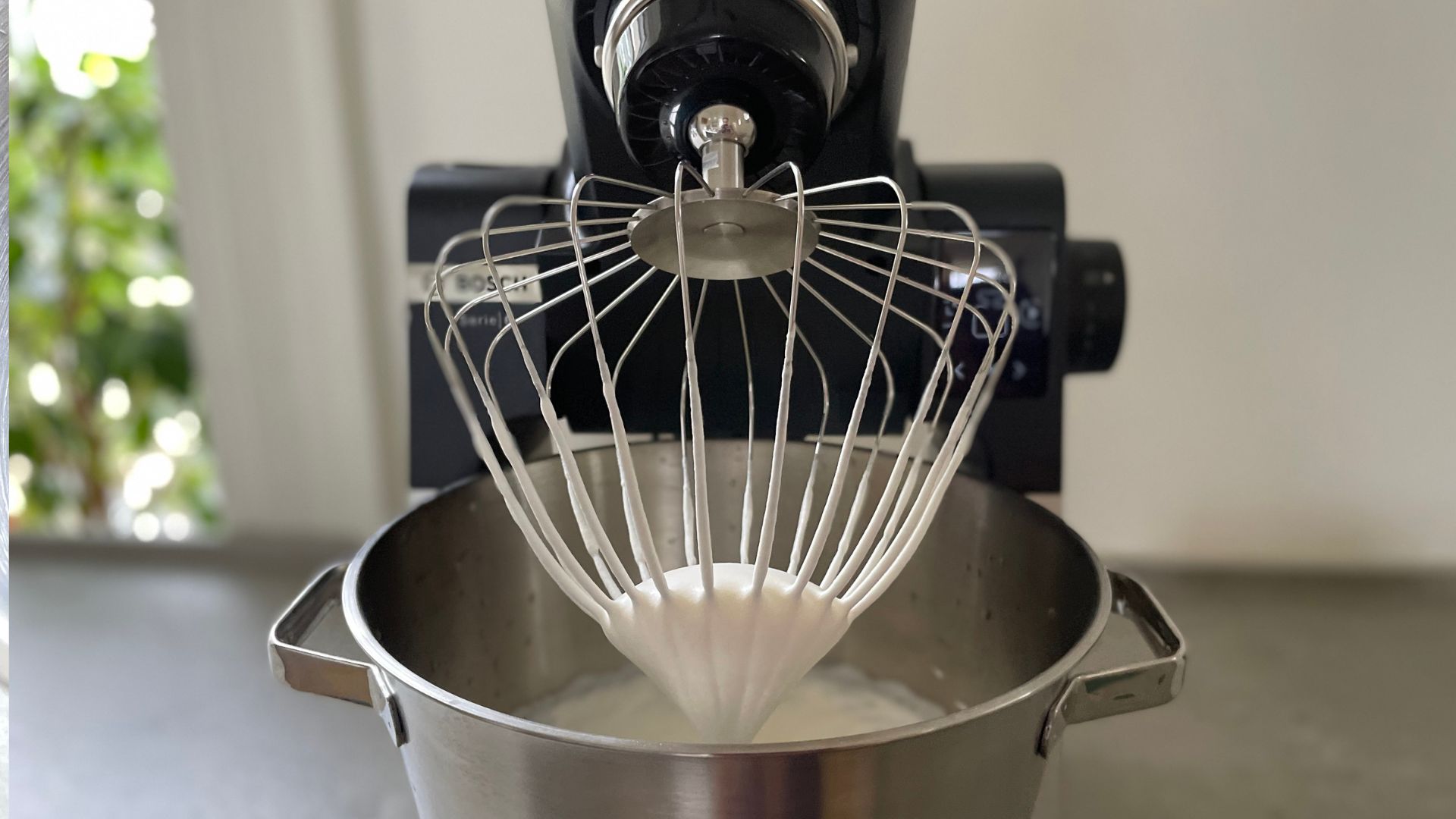
With integrated scales, super fast, angled attachments, and smart features, this is every serious, techy baker's dream. It's technically flawless, modern, and reasonably priced. If you're ready for the future of baking, you'll love this.
-
+
Lots of useful, integrated features (scales, timer)
-
+
Angled attachments cover all parts of the bowl
-
+
Powerful and speedy
-
+
Feels robust
-
-
Some people might prefer a classic system (without screens)
-
-
Modern aesthetic isn't for everyone
Why you can trust Woman & Home

Bosch has broken away from tradition with their stand mixer, offering a top-spec, high-tech stand mixer that makes baking easy. It’s certainly changed the way I look at my KitchenAid.
Historically, the best stand mixers have either been KitchenAids or imitations of the brand’s classic style. However, as is the case with everything, stand mixers have been itching for an injection of some innovation into the industry. Who better to do it than the ever-practical Bosch?
With a base-driven motor, silicone mixer, and digital screen, this stand mixer feels like the future of baking. Bye-bye scales, measuring jugs, timers, and blenders (I know, who’d have thought it?). Bosch is firmly on the scene.
Specifications
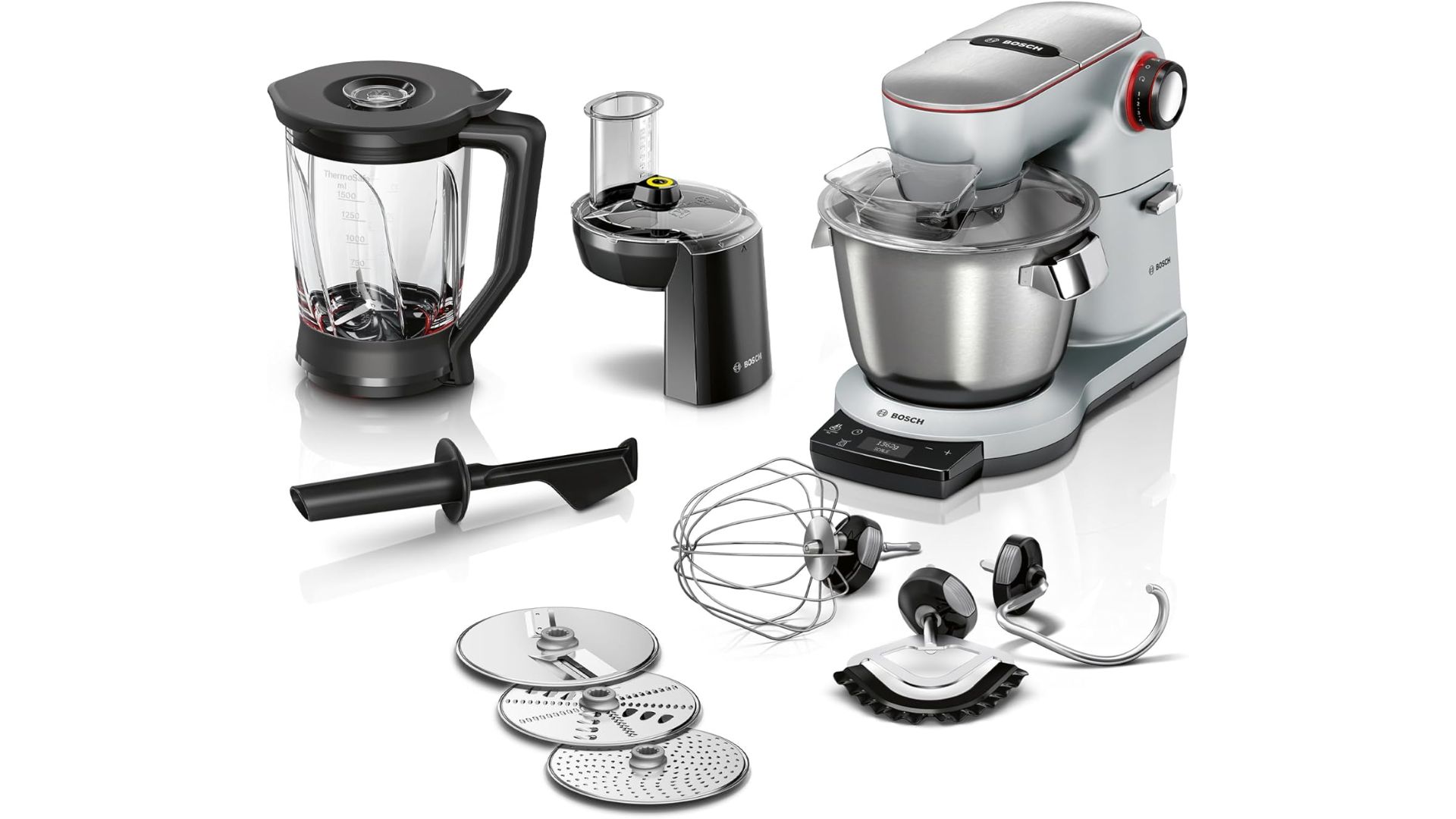
| Dimensions | H33 x W32 x D38cm |
| Weight | 9.10kg |
| Bowl capacity | 5.5L |
| Materials | Stainless steel |
| Power | 1600 watts |
| Speed settings | 7 |
| Attachments | Mixer, dough hook, whisk, splash guard |
| Guarentee | 10 years |
Unboxing
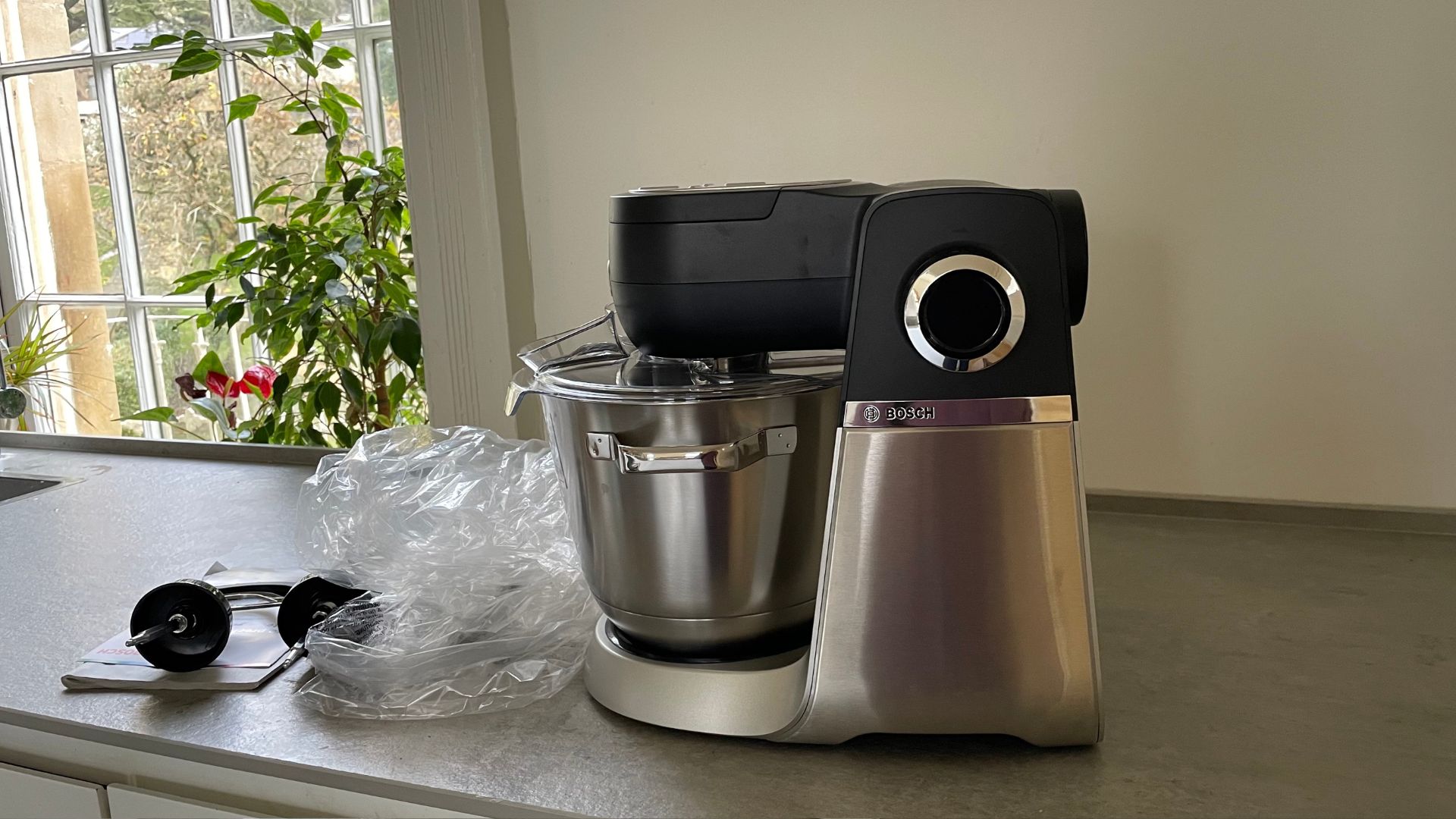
The Bosch arrived in a big carboard box. Whilst it’s heavy, as almost all stand mixers are, there are some useful handles on either side that made this relatively to move around.
Inside, most of the packaging keeping the Bosch in pristine condition is cardboard, which is great from an environmental perspective. There are a few thin, plastic bags, but these can be recycled at bigger supermarkets. In comparison to most other stand mixers on the market, this is some exceptionally eco-friendly packaging.
You’ll get a splash guard, dough hook, whisk, and beater. These are all pretty standard extras to have with your stand mixer, but those with a discerning eye will notice that Bosch has done something a little different too. Rather than clip the end of an attachment into a mixer, you get a pre angled protective cap that comes with each attachment, meaning that all the attachments — most notably the whisk — are tilted slightly outwards. This has some impressive benefits for how well the attachments reach all parts of the bowl, especially the beater with its flexible silicone edges. We’ll get more into the details later, but this is one of those designs where you’ll find yourself wondering why nobody has done it before.
Who would it suit?
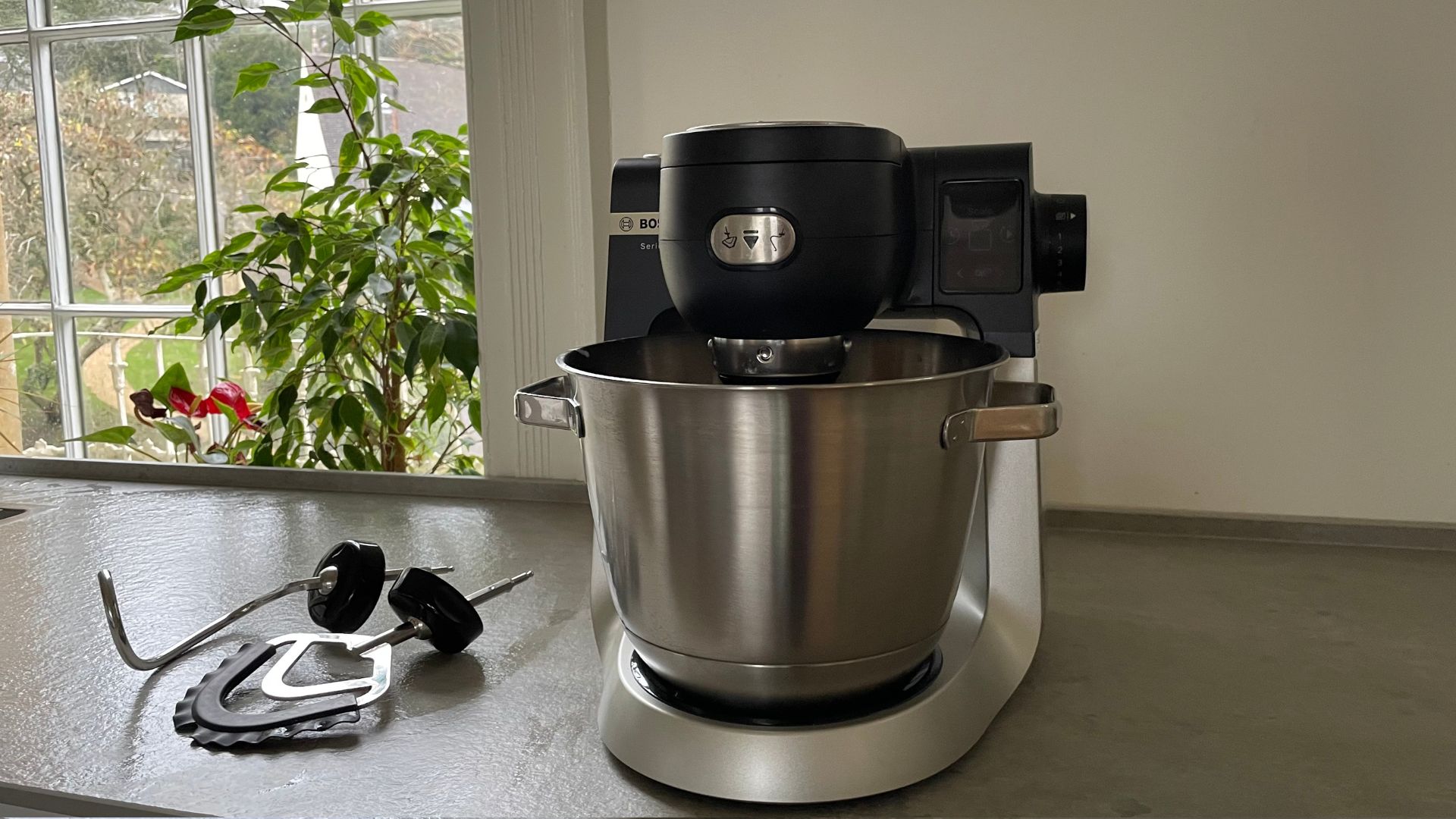
The Bosch stand mixer is a brilliant option for those who want to break from tradition. The digital screen and integrated scales and timer make life very easy, even if you’re not techy. I thought I might miss my traditional kitchen scales, but I really don’t. I can measure out flour, oil, water, milk, and more straight into the bowl thanks to the adjustable scale settings. Beyond that, the machine will automatically time how long it’s been running for, which is incredibly helpful if you’re busy in the kitchen.
Techy extras aside, this is a fundamentally incredible stand mixer. It’s twice as
powerful as KitchenAid's most powerful model, meaning that it works quickly, but surprisingly quietly. The angled attachments and planetary rotation (moving the motor and attachment in opposite directions) leave no grains of flour untouched or cream unwhisked. When I was hand folding berries into batters, I could achieve a speed slow enough to keep the whole berry intact. Then, when I wanted to up the ante, I could whisk cream faster (and more mesmerisingly) than any kitchen accessory I’ve ever tested.
So, if you're a budding baker looking for something with power, capacity, and versatility this is perfect. The aesthetic is a little more industrial than traditional stand mixers, but that matches the performance too.
What is it like to use?
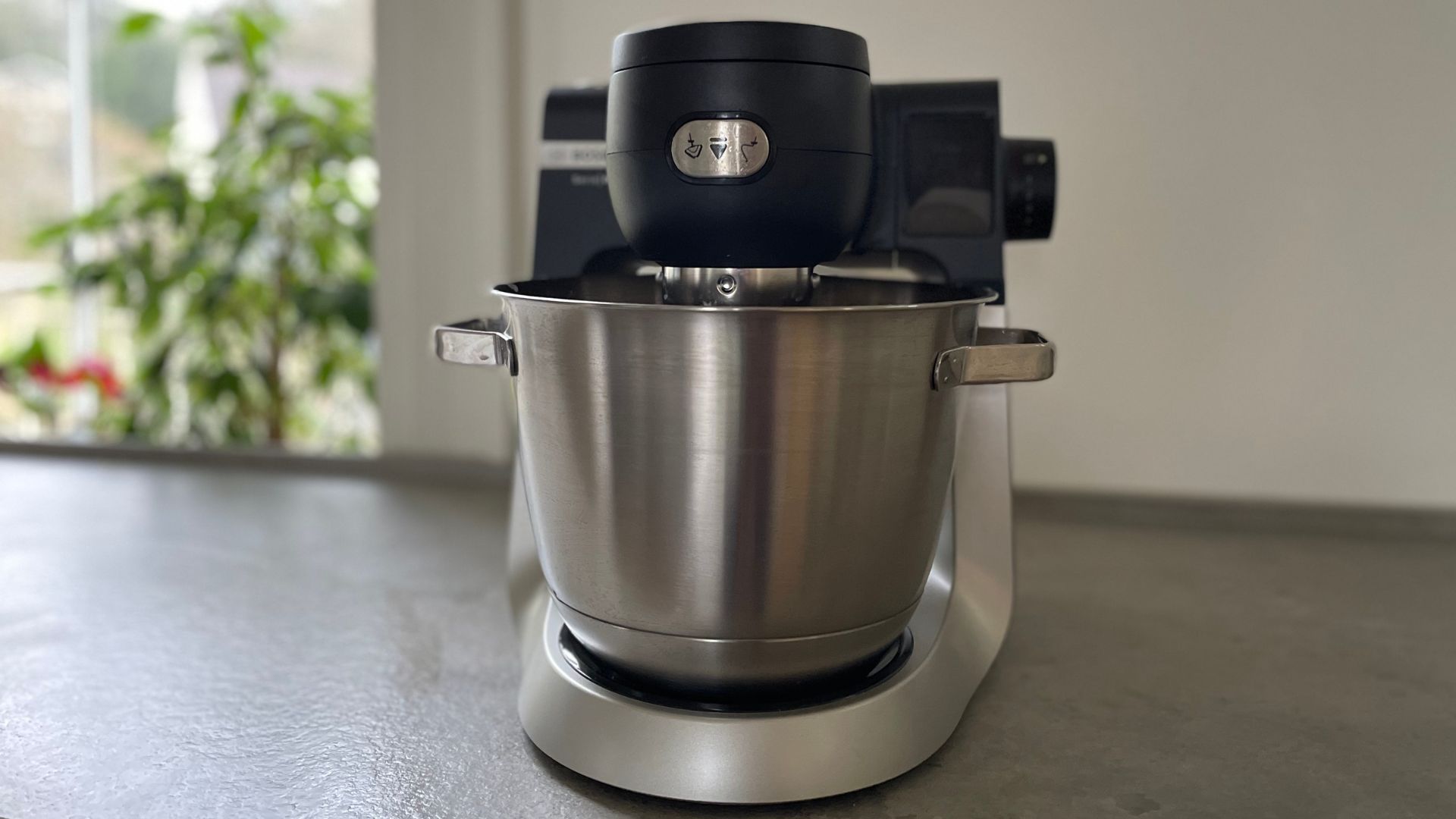
Once out of the box, there isn’t really anything that you need to do to prep the Bosch ready for use. The digital screen asks you to set a language and preferred metric system (but if you change your mind, these are easy to adjust). I have the bowl and different attachments a quick rinse, just in case they had factory dirt and dust on them, and then I was ready to put this to the test.
Test 1: cake mix
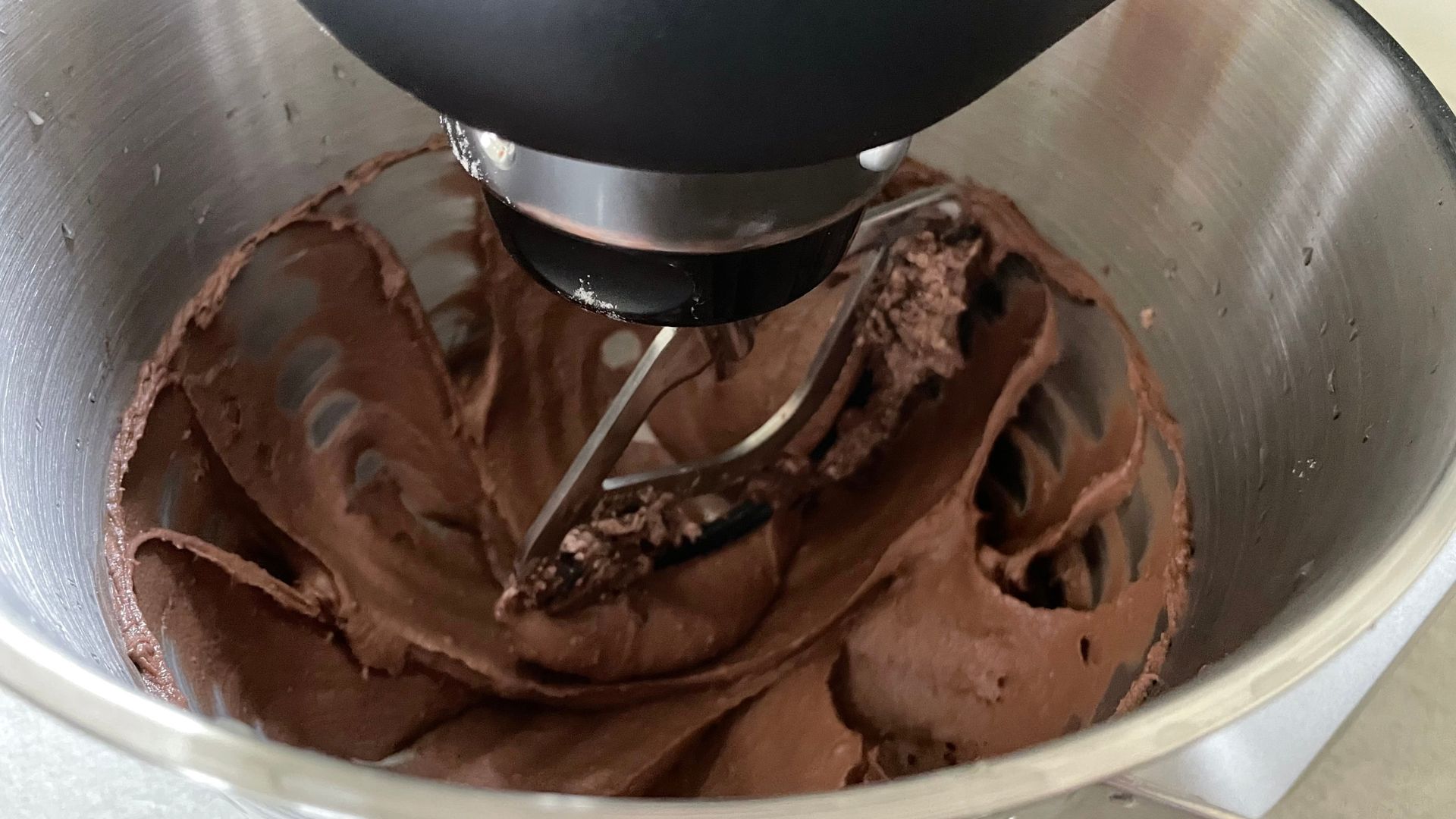
The first test that I put all of our stand mixers through is making a cake. The two come hand in hand and it’s a basic skill that I think every stand mixer should be able to whizz their way through. I started by creaming the butter and sugar together since this is integral to a lot of classic bakes (butter icing, cookie dough, pastry) and the beater tackled this effortlessly.
I hardly had time to breathe (more specifically 49 seconds) before the cubes of butter had been transformed into fluffy peaks of butter and sugar. Next, I added my flour, eggs, and vanilla. The scales are really sensitive to everything that you add, but the downside of using the stand mixer as a scale is that you have to add everything in at once or try to remember how much you’ve added in each little bit. I don’t mind this and, even when I was adding liquids, this is quick and reactive enough that I didn’t overpour at any point.
Even though Bosch provides a splash guard, I wanted to give this a trial without one, to see how well the Bosch could manage its speed. I started on the low-speed setting and watched the mixer deftly incorporate the wet and dry ingredients together until I was left with a silky batter. There were no lumps or clumps, just smooth cake mix.
When I wanted to pour the mix into my cake tins, the useful handle proved the perfect position for pouring. It’s big enough to get a good grasp, the bowl isn’t too heavy to hold and pour. It’s nothing short of perfection.
I’ve since made a whole host of different recipes, including more cakes, muffins, and cookie doughs and the Bosch hasn’t been phased by different liquid contents and recipes. It’s really impressive.
Test 2: bread dough
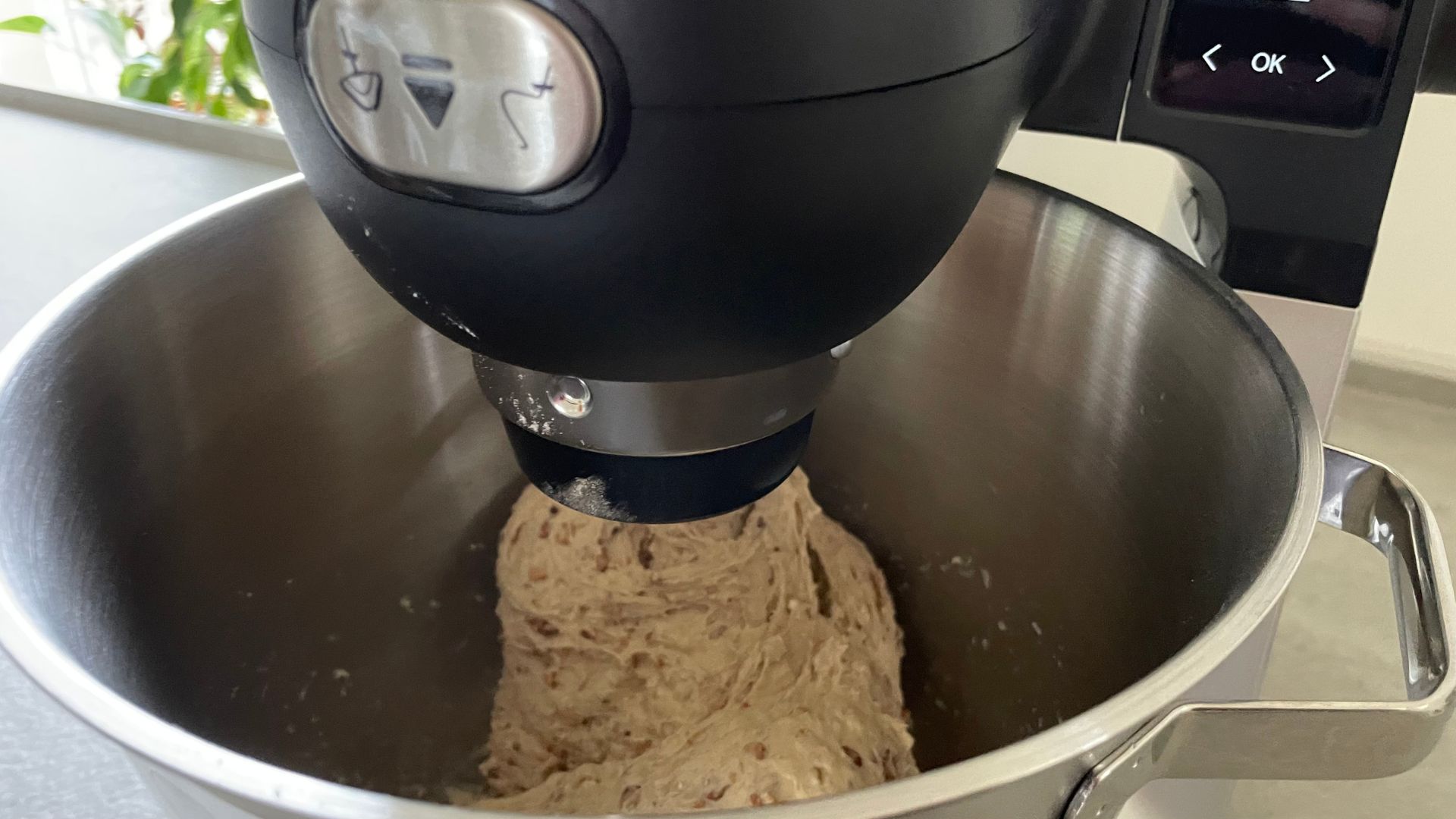
My second test for all stand mixers is making a loaf of bread. Whilst the average bread dough should be easy to manage, there are plenty of machines that struggle with sticking around the dough hook, leaving a large percentage of the dough sticky and sloppy (or still dry and floury).
I made my classic recipe, with 500g of brown flour, 7g of yeast, a pinch of salt and 300ml of hand hot water and olive oil. I was most weary about free pouring the water and olive oil into the bowl for the stand mixer to measure, but it was fine. The scale speedily kept up with my pouring, stopping exactly when I stopped at the perfect time. Then, I could flick on the screen, setting the scales to measure in ml (oil) rather than ml (water), which was just one indicator that Bosch had done a really thorough design job.
Once all the mix was in place, this kneaded the dough into an elastic ball. I didn’t need to interfere once. The dough came together into a really smooth mix. I took it out to knead on the surface by hand so that I could get a good feel of the dough and it was gorgeous: warm, soft, and springy. I couldn’t fault it. In fact, this whole process was complete within a perfect four minutes. That’s almost quicker than my toaster.
Test 3: whipped cream
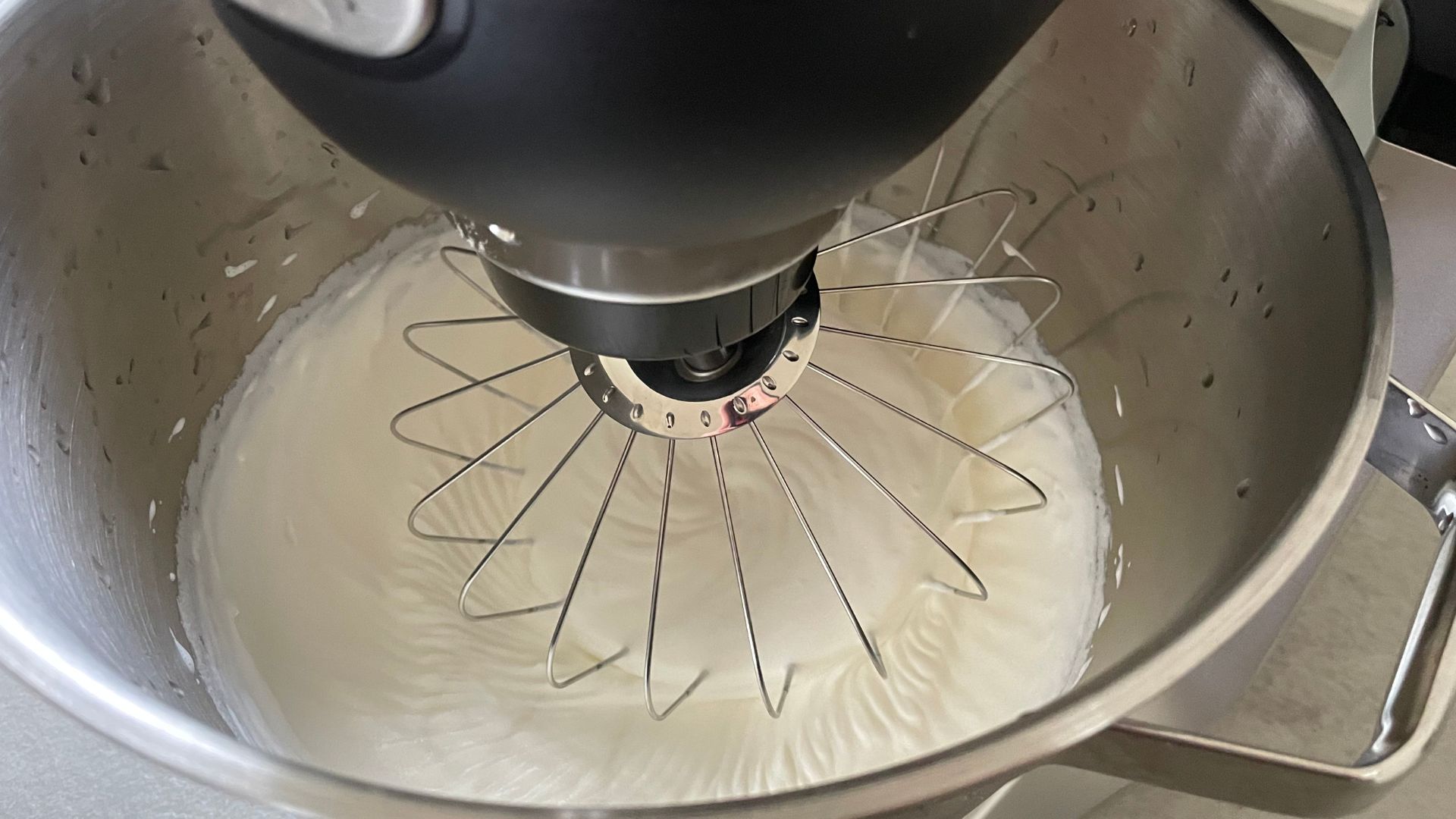
This was by far the most mesmerising test I’ve done on any stand mixer, let alone the Bosch. The angled whisk elegantly oscillated at an angle, catching all the edges of the bowl. It was sensitive to changes in speed, quick where it needed to be and powerful too. I first tried whipping double cream and vegan cream. The double cream became thick, silky peaks in next to no time. It was seriously impressive. In previous tests, I’ve found that stand mixers can be slow when whipping vegan double cream, but this had my vegan cream thick in two minutes. If I had every stand mixer I’ve ever tested, lined up on a counter, this is the one I’d choose to whip cream. The only, slightly odd feature is that when the head lifts up, the whisk almost sits outside of the bowl, so you can’t have it standing in position, otherwise your mix could drip onto the counter. This is true for all the attachments, but I noticed it the most when I was using the whisk for whipping aquafaba, pancake batters, and more.
Cleaning
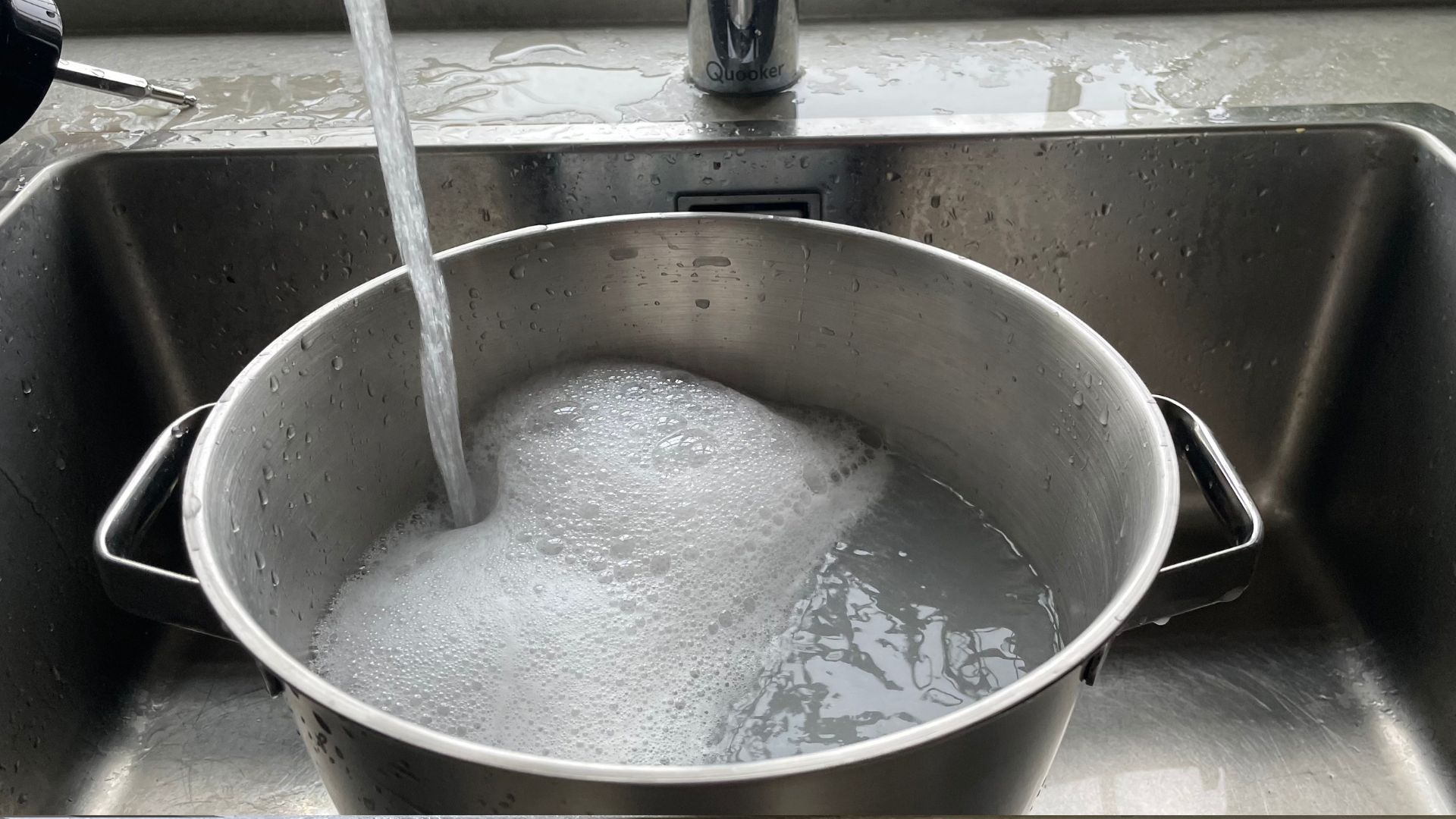
Bosch says that the bowl and attachments are dishwasher safe, but given the size of them (and the fact that there’s silicone and plastic on the attachments), I would recommend washing them by hand. They’ll last a lot longer without all that wear and tear.
Washing by hand is easy: the silicone beater is easy to wipe clean and I found that lots of the remnants of my cooking slid off with a little warm water and Ecover (or Method). Overall, the mixer didn’t get too marked or greasy as I was using it, but I would recommend using a warm damp cloth to wipe the screen bowl and top. It’ll keep it all looking shiny and bright.
How does it compare?
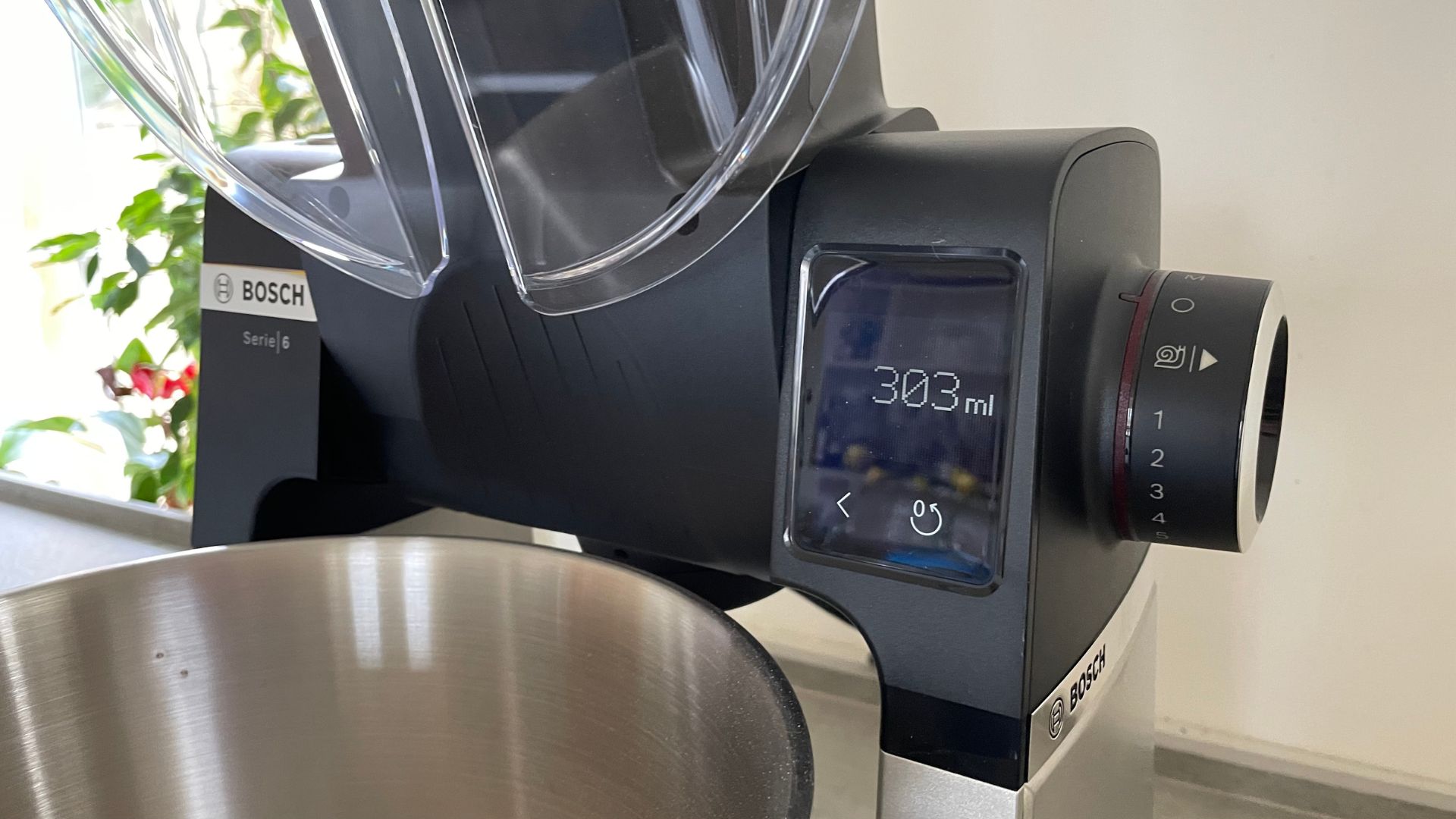
Testing the Bosch threw me into a bit of an exi-stand mixer crisis. I’ve always believed that KitchenAid makes the best stand mixers, but Bosch’s smart, useful technology has some great appeal. I’ve been chewing this dilemma over for the past few weeks and here’s my conclusion: if you want a classic, timeless stand mixer, put your money on the KitchenAid Artisan 4.7L Stand Mixer. You could buy this model in 20 years and it’ll still look the same. It’s powerful, simple, and technically perfect. And, you don’t have to worry about technology getting in the way — no glitching screens, dodgy detection, and electric hazards.
On the other hand, I’ve read reviews of people who have had their Bosch stand mixers for over ten years (it’s guaranteed for 20). Given that Bosch promises these mixers will work for this long, you can bank on the fact that your scales will always calibrate correctly, your timer will always deliver precise results, and your settings will always be adjustable. With that in mind, the Bosch elevates the kitchen experience, cooking up a much more seamless baking experience. You won’t need your scales or your timer anymore and that’s a lovely feeling.
Should you buy it?

If you have a modern kitchen and you’re excited by the prospect of a stand mixer that’s been disruptive in the industry, this is the perfect model for you. The flawless performance puts this firmly at the top of my list of stand mixers and it poses the greatest threat to KitchenAid that I’ve tested so far.
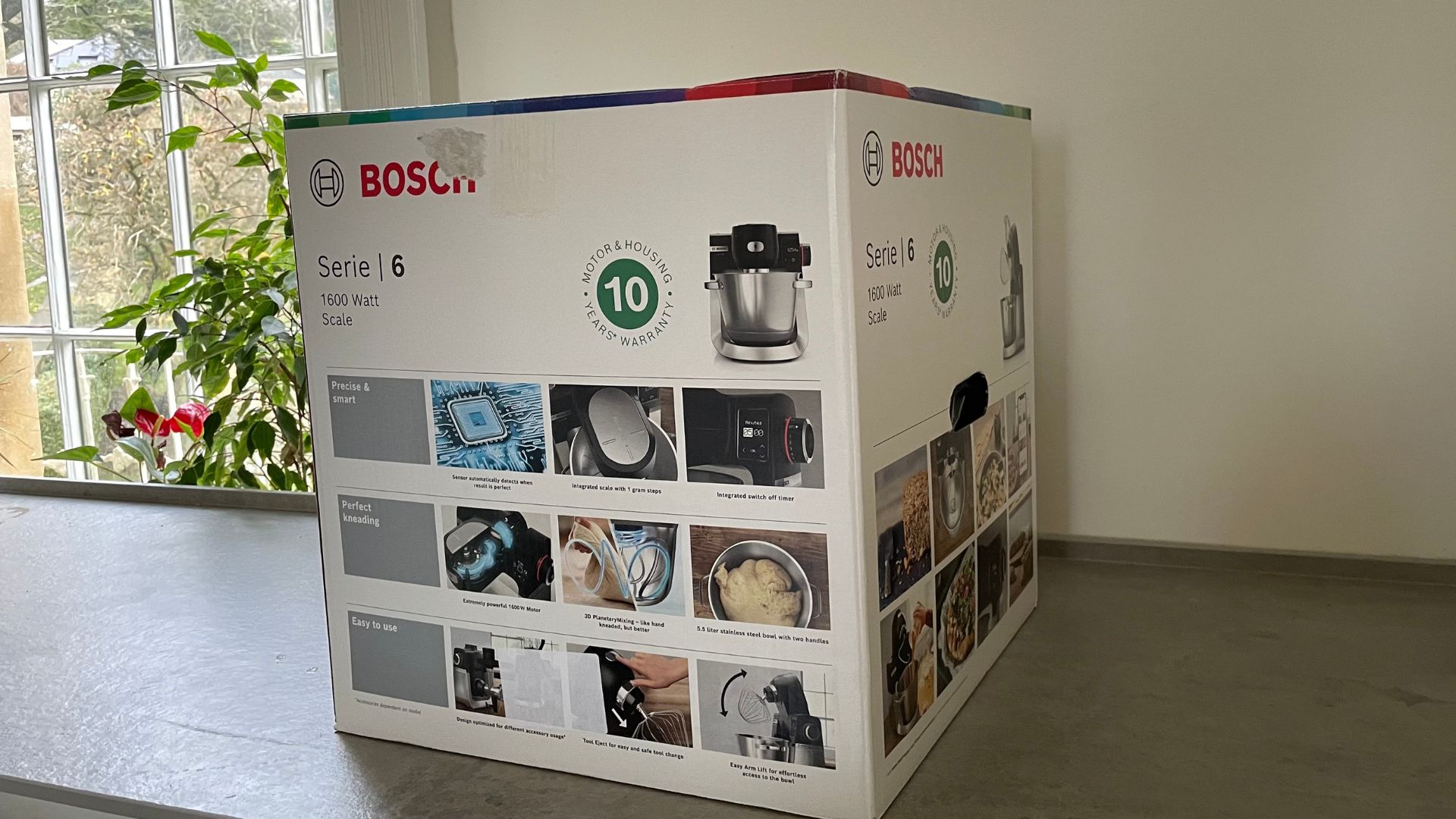
Sign up for the woman&home newsletter
Sign up to our free daily email for the latest royal and entertainment news, interesting opinion, expert advice on styling and beauty trends, and no-nonsense guides to the health and wellness questions you want answered.

Laura is woman&home's eCommerce editor, in charge of testing, reviewing and creating buying guides for the Homes section, so you'll usually see her testing everything from the best dehumidifiers to sizing up the latest Le Cruset pot. Previously, she was eCommerce editor at Homes & Gardens magazine, where she specialised in covering coffee and product content, looking for pieces tailored for timelessness. The secret to her heart is both simplicity and quality. She is also a qualified Master Perfumer and holds an English degree from Oxford University. Her first editorial job was as Fashion writer for The White Company.
-
 Princess Eugenie gives knitwear a spring makeover with short sleeved jumper and satin skirt at poignant London visit
Princess Eugenie gives knitwear a spring makeover with short sleeved jumper and satin skirt at poignant London visitPrincess Eugenie isn’t a working member of the Royal Family, but she’s a dedicated Patron of several vital charities and organisations.
By Emma Shacklock Published
-
 Ruth Langsford just gave us the green light to wear two watches - one for fitness, one for fashion
Ruth Langsford just gave us the green light to wear two watches - one for fitness, one for fashionIt might seem like you have to take a 'one or the other' approach, but this doesn’t have to be the case.
By Emma Shacklock Published
-
 Bye skinny jeans, hello palazzo trousers - Meghan Markle nails New York spring style with her ultra-wide leg look
Bye skinny jeans, hello palazzo trousers - Meghan Markle nails New York spring style with her ultra-wide leg lookJeans will never fully be replaced in my wardrobe but I’ve been finding myself drawn to wearing trousers more and more recently.
By Emma Shacklock Published